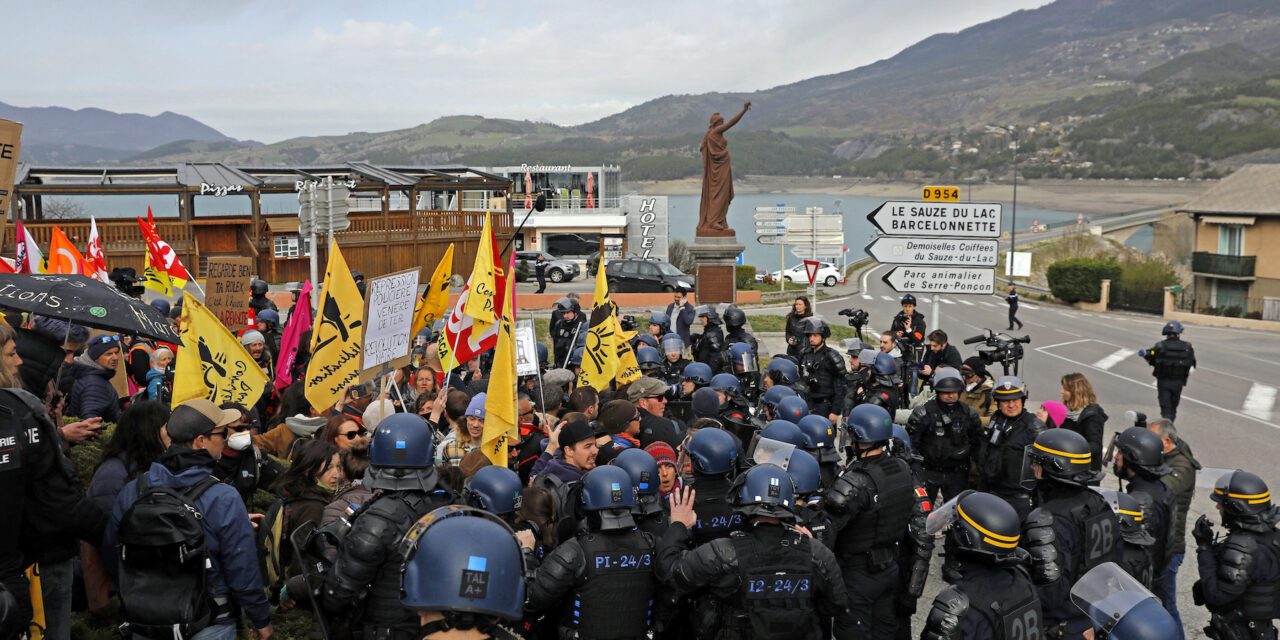PARIS (Reuters) -French President Emmanuel Macron sought to rally citizens around a plan to save water on Thursday and stressed that protests will not stop reforms, in a nod to both climate change and an unpopular pension bill.
The water-saving plan includes 50 measures, such as fixing leaking pipes, adapting the way farmers and the nuclear industry use water and making water more expensive for those who use it in excess of basic needs.
“In the face of change, there are necessarily constraints, we must explain them, share them and make each and every one aware of their responsibilities,” Macron said.
This was the president’s first major policy announcement and public outing after weeks focused on the pension bill, which has triggered fierce protests across the country. With the water plan, Macron and his government are looking to move to other topics.
“There are protests, but it does not mean everything must stop,” Macron said.
But he was welcomed in Savines-le-Lac in the Alps, where he gave his speech, by groups of protesters angry with the bill, which raises the pension age by two years.
One placard read “Macron resign!” and another “Take your pension, not ours.” Local media said two protesters were arrested.
Water is also a contentious topic in France as the worst drought on record last summer sharpens the debate over water resources in the European Union’s biggest agricultural producer.
Two men are in a coma after violent clashes on Saturday between protesters and police during an unauthorised demonstration against the construction of a giant water reservoir for farm irrigation in western France.
Farmers say they need large reservoirs to be able to water their crops this summer, while environmental groups say these waste water and are a way for farmers to confiscate a common good.
Before his speech, Macron told reporters that protests would not stop him from adopting new policies.
“Nothing justifies violence in a democratic society,” he said, adding that at Saturday’s protest against the reservoir, in the town of Sainte-Solines in western France, “thousands of people were there simply to wage a war, and that’s unacceptable.”
Some 58% of the water used in France goes to farming, 26% to drinkable water, 12% to cool down nuclear reactors and 4% goes to industrial uses.
In some towns, half the water is lost to water leaks, with a nationwide average of 20%. Macron said France would, as an emergency, devote 180 million euros ($196.31 million) to fixing leaks in the most at-risk towns, to upgrade networks.
Beyond this, other measures such as making water more expensive after basic needs are covered, aim to encourage people and businesses to use less, he said.
He also plans a new app that will inform residents if water usage in their area has reached a critical level on the model of the Ecowatt app launched for electricity use to encourage savings this winter.
(Reporting by Benoit Van Overstraeten, Ingrid Melander, Elizabeth Pineau, Sybille de La Hamaide; Writing by Ingrid Melander; Editing by Raissa Kasolowsky and Sharon Singleton)
Members of French labour unions face police forces as they demonstrate ahead the arrival of French President Emmanuel Macron (not pictured), in Savines-Le-Lac, South Eastern France, 30 March 2023. President Macron is expected to announce a national water management plan days after a violent demonstration by opponents of a proposed water reserve for agricultural irrigation. SEBASTIEN NOGIER/Pool via REUTERS


